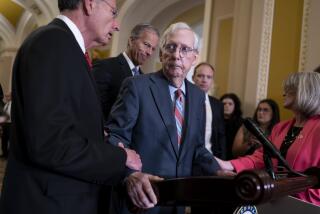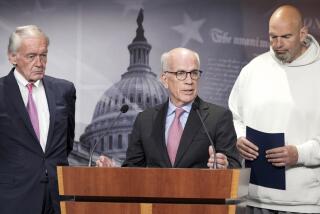Ashcroft Reaping the Benefits of Membership
- Share via
WASHINGTON — While several Democrats continued to grill John Ashcroft on his conservative record in Wednesday’s confirmation hearing, the former senator clearly is reaping the benefit of his membership in one of the world’s most exclusive political clubs.
Many former colleagues seem to like Ashcroft personally, including a number of his ideological opposites. This genial attitude toward the Missouri Republican is a key reason why he remains an odds-on favorite to win Senate confirmation to become attorney general, with support from at least some Democrats. One, Zell Miller of Georgia, announced Wednesday that he will vote for Ashcroft--the first member of his party to do so.
Ashcroft’s chances got a further boost when Senate Democratic Leader Tom Daschle of South Dakota said that he would not support a filibuster of any of President-elect George W. Bush’s Cabinet nominees. That undercuts the chances that any Democrat could gather the 41 votes needed to sustain such an effort.
To be sure, several of the Senate’s 50 Democrats appear to be leaning against Ashcroft. And his hearing before the Senate Judiciary Committee hardly has been a cakewalk. Wednesday’s questioning included skeptical queries about Ashcroft’s commitment to upholding abortion rights and federal gun laws, as well as a review of his 1999 opposition to the appointment of a black Missouri judge to the federal bench.
At one point, asked about an interview he had given to a magazine sympathetic to the Confederacy, Ashcroft said that, if he had fought in the Civil War, he would have been on the side of the Union.
But even in that tense exchange with Sen. Joseph R. Biden Jr. (D-Del.), Ashcroft referred to the questioner as “my friend.” Such courtesy is routine among senators, and that tradition clearly has worked to Ashcroft’s advantage.
Consider the casual but telling remarks of Sens. Herbert Kohl and Russell D. Feingold, two Wisconsin Democrats on the committee who share little in common with Ashcroft politically.
Kohl on Wednesday said Ashcroft, who served one Senate term before losing his reelection bid in November, had been “a very respectable senator, obviously.” Even as he questioned Ashcroft on antitrust enforcement, Kohl said: “You’re likely to be confirmed, as we all know.”
On Tuesday, Feingold lightened a tense opening-day hearing by telling a story about how Ashcroft once gave him and Sen. Paul Wellstone (D-Minn.)--one of the chamber’s most liberal members--a ride home from the Capitol.
“A kind gesture but a wild, somewhat hair-raising ride,” Feingold described the experience, expressing thanks that Ashcroft had not been nominated for Transportation secretary. The packed chamber cracked up.
Such anecdotes offer a counterpoint to the image of Ashcroft that liberal interest groups bent on defeating his nomination have sought to depict--a dogmatic Christian conservative who would wreak havoc on abortion rights, gun control and civil rights.
Ashcroft’s defenders have blasted that portrait as a caricature--an assertion that may be helped when even two Democrats who have peppered him with pointed questions at this week’s hearings, Biden and Sen. Edward M. Kennedy (D-Mass.), frequently refer to him as John.
It has long been true that, when it comes to Cabinet nominations, the Senate takes care of its own. In all, 87 people who have served in the Senate later have been confirmed for Cabinet posts, including such 19th century giants as Henry Clay, Daniel Webster and John C. Calhoun.
The few exceptions only prove the rule. In 1989, the Senate rejected the nomination of former Sen. John Tower (R-Texas) to be Defense secretary in the earlier Bush administration. Tower’s nomination was derailed in part by allegations that he had bouts of excessive drinking.
But that rejection was the first time in more than a century that a onetime senator had failed to gain confirmation to a Cabinet seat. The nomination in 1868 of Thomas Ewing Sr., a former senator from Ohio, to be secretary of War was withdrawn by President Andrew Johnson after a Senate committee refused to act on it.
To be sure, the Senate historically has confirmed most Cabinet appointments. Only 18 of 716 such appointments the Senate has ever considered have been rejected or withdrawn.
But the Senate unquestionably gives special deference to those who have served there. Former senators can be seen walking around Capitol security checkpoints. When their names come up in a different context, they usually win special praise on the Senate floor. Plus, they keep the title for life--once a senator, always a senator.
Hours after Bush nominated Ashcroft on Dec. 22, an aide to the Bush transition called reporters to offer contact information for three Democrats who would speak favorably of the nominee: Kohl, Feingold and Sen. Robert G. Torricelli of New Jersey.
Torricelli that day said of Ashcroft: “I don’t have any doubts of his fidelity to the law. He’s a very principled individual. He is generally respected as someone who is very straight and direct. No one ever gets a sense of John Ashcroft that his political views are a calculation.”
Feingold, best known for co-sponsoring campaign finance reforms that are anathema to Ashcroft and most Republicans, called him “earnest, interesting, open, unguarded”--unlike many senators who watch carefully what they say to their peers. “I really think it’s going to be good to work with him. That’s the truth,” Feingold said.
Such sentiments are evidence that the ideological, regional and partisan divisions in the Senate are frequently muted by personal relationships.
That is not to say the Senate is the insular institution that it was a few decades ago. These days, close observers said, senators do not meet socially as they once did. There are fewer informal lunches or dinners featuring members of both parties, fewer late-night gatherings in back rooms over a glass of bourbon or Scotch. (Ashcroft does not drink.)
Several senators said Ashcroft simply built up a measure of goodwill by acting fairly and forthrightly in subcommittees, committees and on the Senate floor.
Wellstone, in particular, has been striking in his profession of friendship toward Ashcroft. Although the Minnesotan said that he is still undecided on the nomination, he told “Fox News Sunday”: “John Ashcroft gives me what you call cognitive dissonance. You know, how can a person that you enjoy and like sometimes have such harsh views? I like him a lot. He’s a friend, maybe a good friend.”
Wellstone’s staff hastened to clarify that the two senators have not met socially after hours.
Still, their rapport was apparent one day a few years ago when Wellstone was chatting with a reporter on Capitol Hill, his arm in a sling after an injury. Ashcroft walked by and needled him. “If you don’t straighten up, I’m gonna break the other one!” he said.
Wellstone burst into laughter.
*
Times staff writer Edwin Chen contributed to this story.
*
More Inside
EPA Make-Over: Christine Todd Whitman vowed a new approach as head of the agency, A12
Global Issues: Secretary of State-designate Colin L. Powell faced tough questioning, A13
Balanced Stance: Bush nominee reconciles anti-abortion views with backing for stem cell research, A13
Thwarted Judge: The jurist cited by foes of John Ashcroft is to testify today, A15
More to Read
Get the L.A. Times Politics newsletter
Deeply reported insights into legislation, politics and policy from Sacramento, Washington and beyond. In your inbox twice per week.
You may occasionally receive promotional content from the Los Angeles Times.










